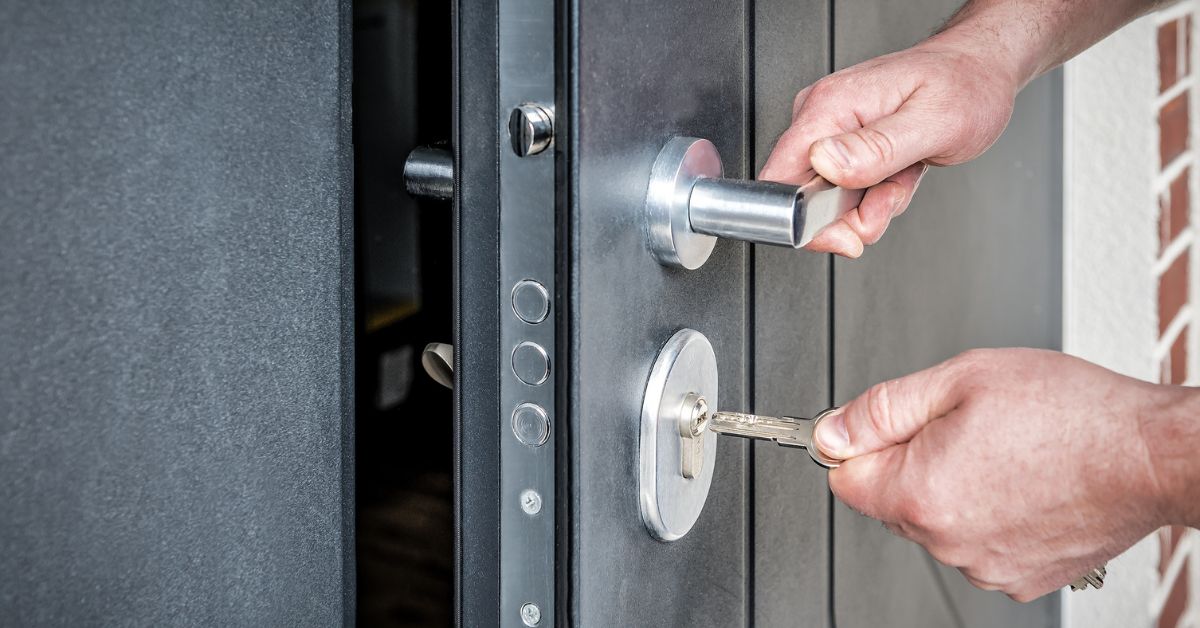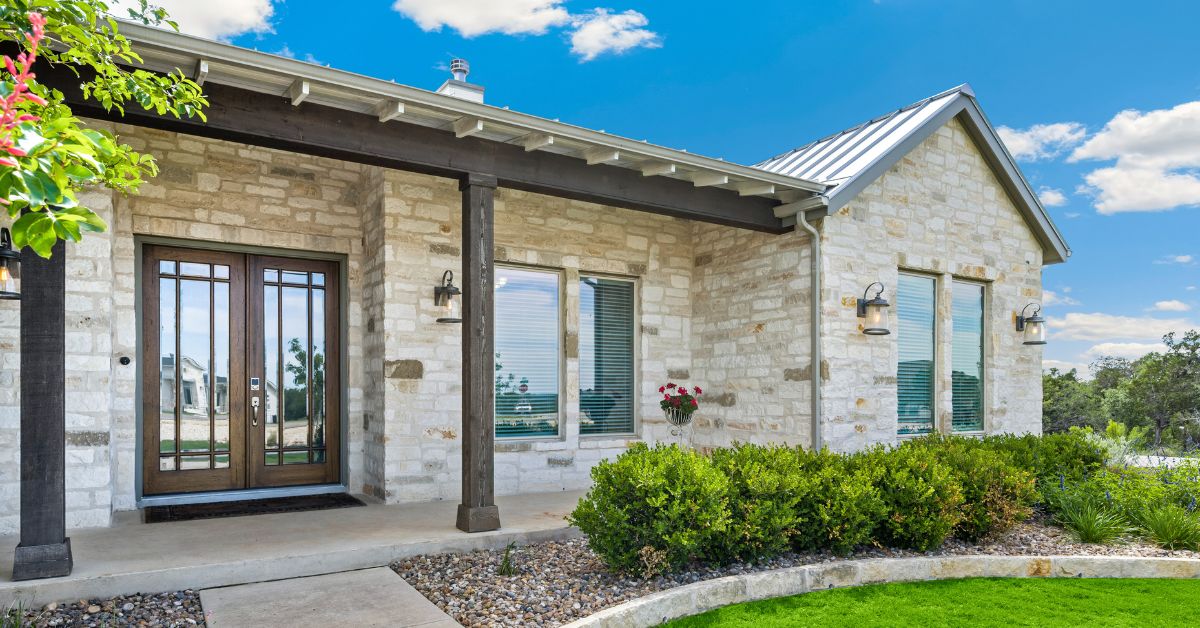How Does Commercial Door Hardware Differ From Residential?

Door Handles and Levers
Compared to residential door handles, commercial door handles endure significantly more stress. A typical office building door might see hundreds of uses per day, while your home’s front door experiences perhaps a dozen.
Commercial
To withstand constant use, commercial handles use heavier-gauge materials such as stainless steel or brass. You’ll find that commercial levers feel more substantial in your hand because they contain internal mechanisms designed for longevity. The mounting hardware extends deeper into the door frame, distributing force across a larger area.
Also, the Americans with Disabilities Act (ADA) requires that commercial spaces install lever-style handles. This guarantees that people with limited hand mobility can operate the door easily.
Residential
Residential handles prioritize aesthetics alongside functionality. You can choose from decorative finishes, ornate designs, and materials that complement your home’s style. Rather than industrial-strength durability, the internal mechanisms focus on smooth operation.
Additionally, residential spaces face no ADA requirements, allowing for traditional doorknobs and specialty hardware.
Lock Systems
Your home’s deadbolt serves a fundamentally different purpose than a commercial lock system. Residential locks focus on keeping unwanted visitors out while allowing easy access for family members. Commercial locks must balance security with access control, emergency egress, and regulatory compliance.
Commercial
Commercial lock systems often integrate with electronic access control. You might encounter card readers, keypad entry, or biometric scanners that connect to building-wide security networks. These systems track entry and exit times, restrict access to specific areas, and can be programmed remotely. Commercial locks must meet ANSI/BHMA Grade 1 standards, the highest level of security and durability testing.
Plus, fire codes heavily influence commercial lock design. Most commercial spaces require locks that allow free egress during emergencies. Regardless of the lock’s normal state, you’ll notice that many commercial doors have panic bars or exit devices that unlock with a simple push.
Residential
Residential locks prioritize simplicity and cost-effectiveness. Your home might use a basic deadbolt system with physical keys, smart locks with smartphone connectivity, or keypad entry for convenience. These systems focus on family access patterns rather than managing hundreds of users.
Typically, residential locks use Grade 2 or Grade 3 standards, which require less rigorous testing for cycle life and security resistance.

Hinges
The hinges supporting your doors work harder than you might realize, and commercial hinges face extraordinary demands. A busy restaurant door might swing thousands of times per day, while your bedroom door barely moves a few dozen times.
Commercial
To reduce friction and wear, commercial hinges use ball bearing systems. You’ll find that commercial doors swing more smoothly even after years of use because these bearings distribute the load evenly across the hinge pin. The mounting plates extend further into the door frame, using longer screws that reach the structural framing.
Weight capacity distinguishes commercial hinges from residential options. Commercial hinges routinely support doors weighing 150 pounds or more, while residential hinges typically handle doors under 100 pounds. This difference requires heavier-gauge steel and more robust mounting systems.
Residential
Residential hinges prioritize quiet operation and aesthetic appeal. You can choose decorative finishes, specialty designs, and materials that match your home’s hardware. For smooth, quiet operation, many residential hinges include features such as soft-close mechanisms or adjustable tension.
Door Closers
Door closers differ greatly between commercial and residential hardware. You’ll rarely find door closers in residential settings, but they’re nearly universal in commercial spaces.
Commercial
In commercial spaces, door closers serve multiple functions. They ensure doors close completely after each use, maintaining security and climate control. Fire-rated doors must close and latch automatically to prevent smoke and fire. Accessibility regulations require closers to operate within specific force ranges that allow people with disabilities to open doors easily.
Depending on the application, you’ll encounter different types of commercial door closers, including the following:
- Surface-mounted closers: These attach to the door’s face and frame, providing reliable operation with easy adjustment.
- Concealed closers: For aesthetic appeal in high-end spaces, concealed closers hide within the door frame.
- Floor-mounted closers: They support heavy glass doors in storefronts and office buildings.
Additionally, the adjustment mechanisms on commercial closers allow precise control over closing speed, latching speed, and opening resistance. You can fine-tune these settings to meet building codes while ensuring smooth operation.
Residential
Since homes face different priorities, residential spaces rarely require door closers. Your interior doors typically stay open for convenience and airflow. On the other hand, exterior doors rely on spring hinges or users to ensure proper closing. When residential spaces do use closers, they’re usually lighter-duty models focused on convenience rather than code compliance.

Hardware Finishes
The finish on your door hardware reveals much about its intended use and maintenance requirements. Commercial hardware finishes prioritize durability and antimicrobial properties, while residential finishes focus on aesthetic appeal and design coordination.
Commercial
Commercial spaces favor finishes that resist wear and maintain their appearance under heavy use. You’ll commonly see brushed stainless steel, satin chrome, or architectural bronze finishes that hide fingerprints and wear patterns. These finishes often include antimicrobial coatings that reduce bacteria and virus transmission on high-touch surfaces.
The testing standards for commercial finishes exceed residential requirements. Commercial hardware must withstand salt spray testing, UV exposure, and accelerated wear testing that simulates years of use. Conversely, residential finishes focus on appearance retention under normal household conditions.
Residential
Residential hardware offers extensive finish options to match your home’s design aesthetic. You can choose from polished brass, oil-rubbed bronze, matte black, or specialty finishes that complement your decor. Although these finishes may require more maintenance, they provide the visual appeal that makes your home uniquely yours.
Choosing The Right Hardware
The differences between commercial and residential door hardware extend far beyond simple appearance, with each system addressing distinct challenges.
Whether you’re dealing with a commercial or residential space, research local building codes and accessibility requirements before making final selections. If you need help choosing the best commercial door hardware for your space, don’t hesitate to contact the experts at DoorHub!

Author
Greg Richard
Chief Technical Officer and Founding Member of DoorHub.com